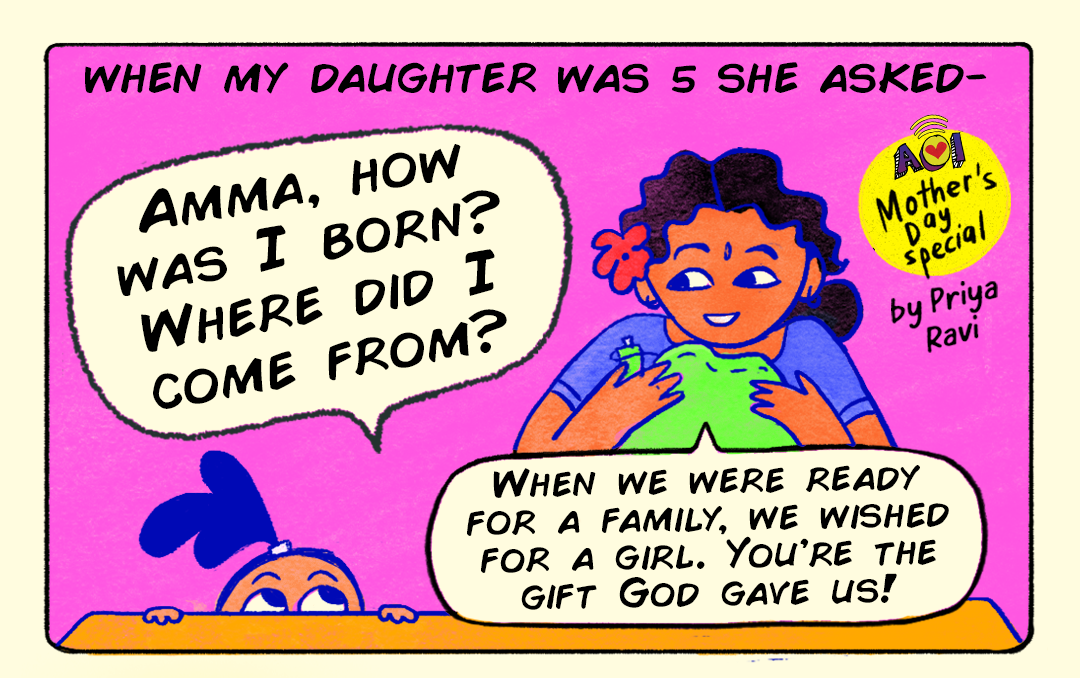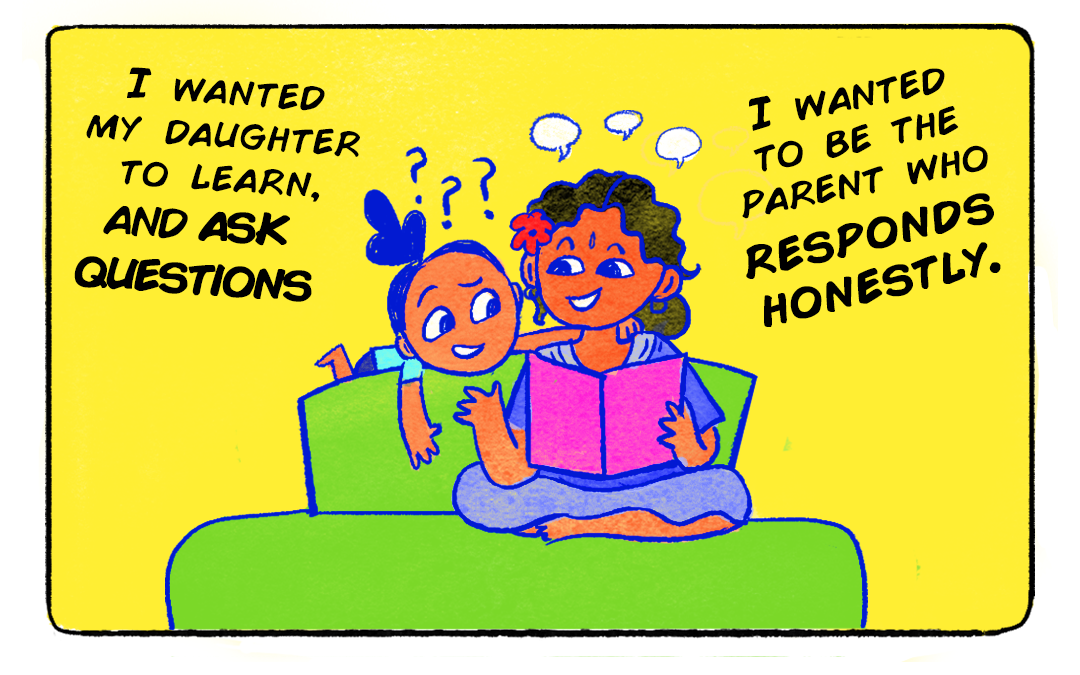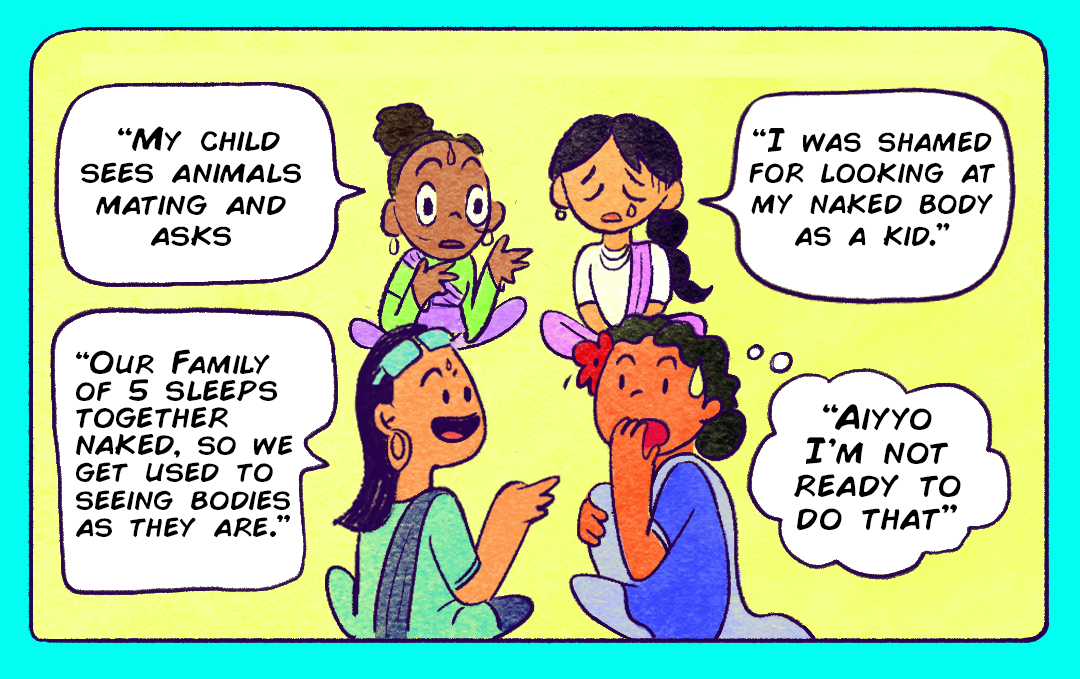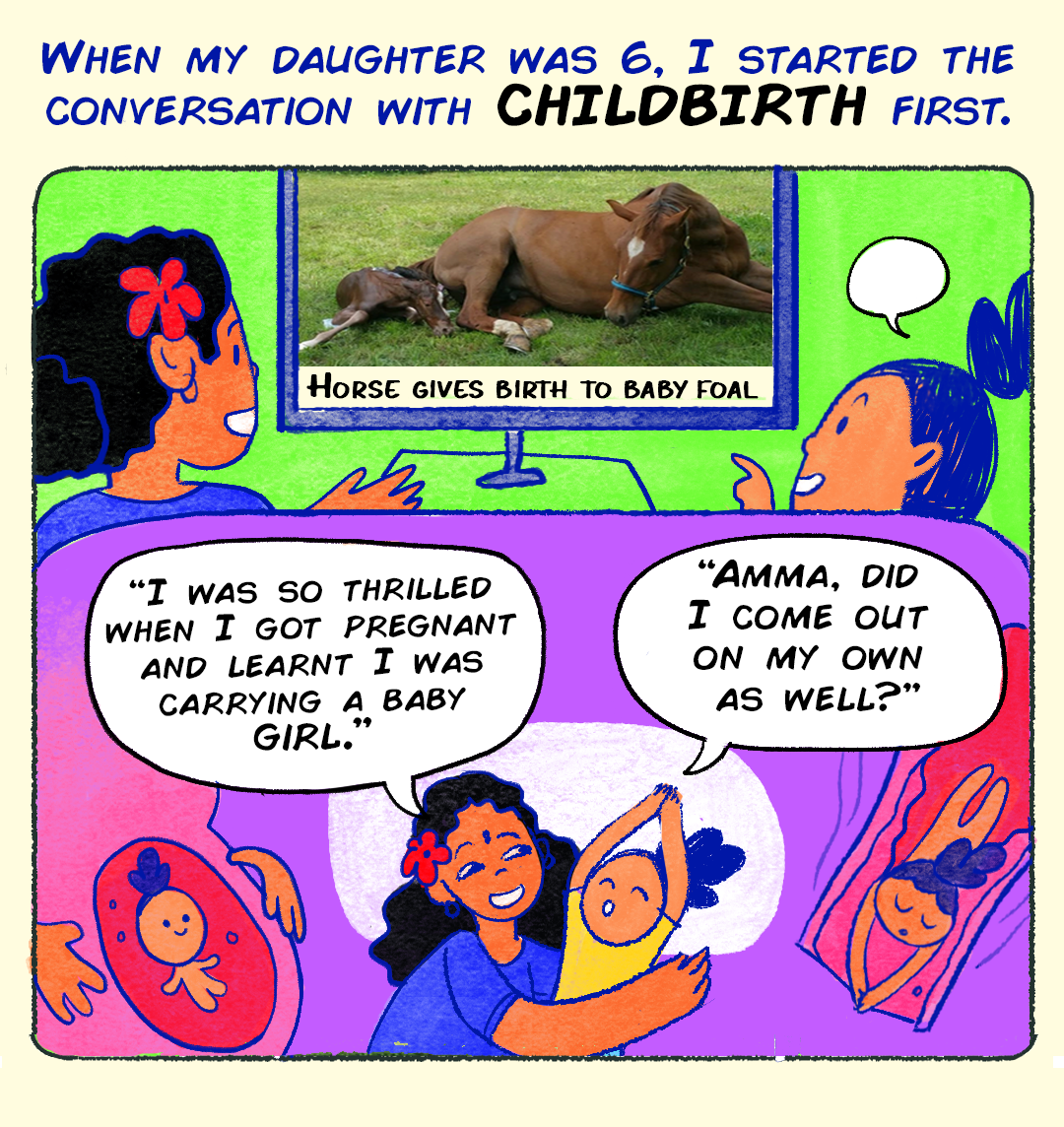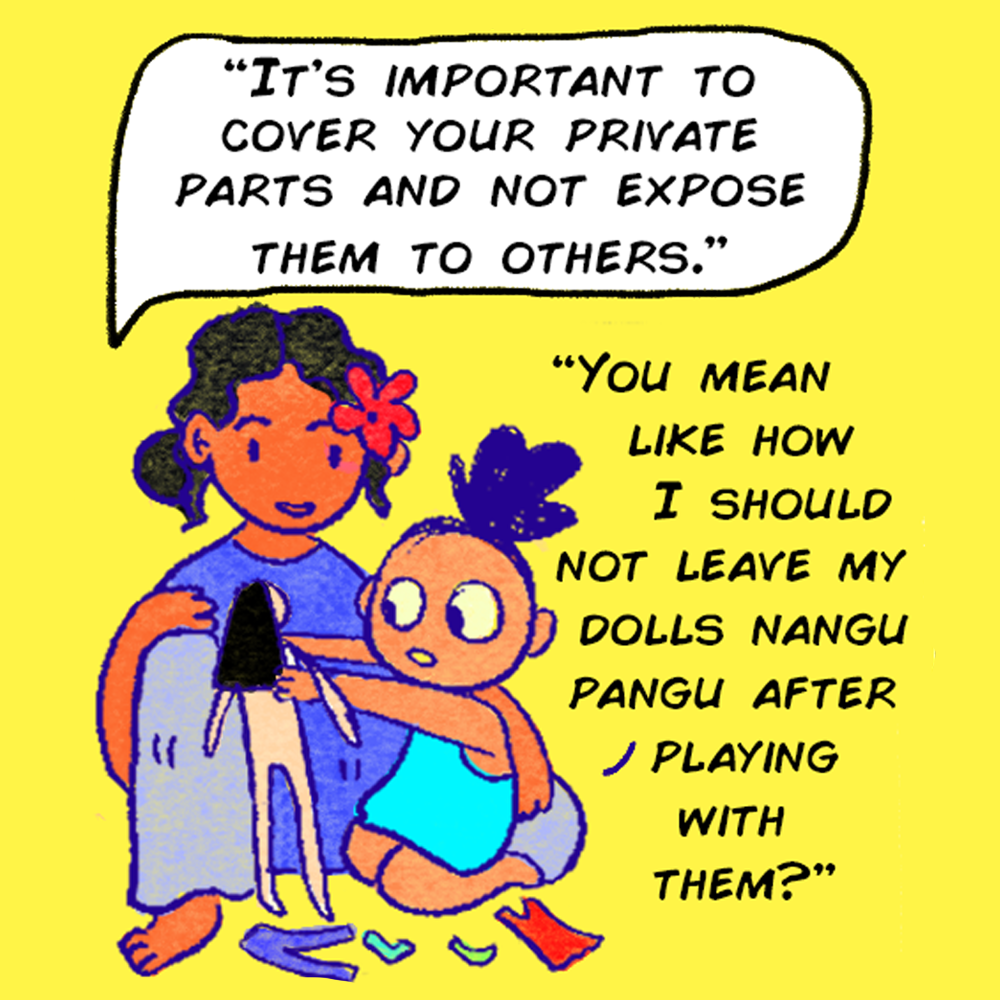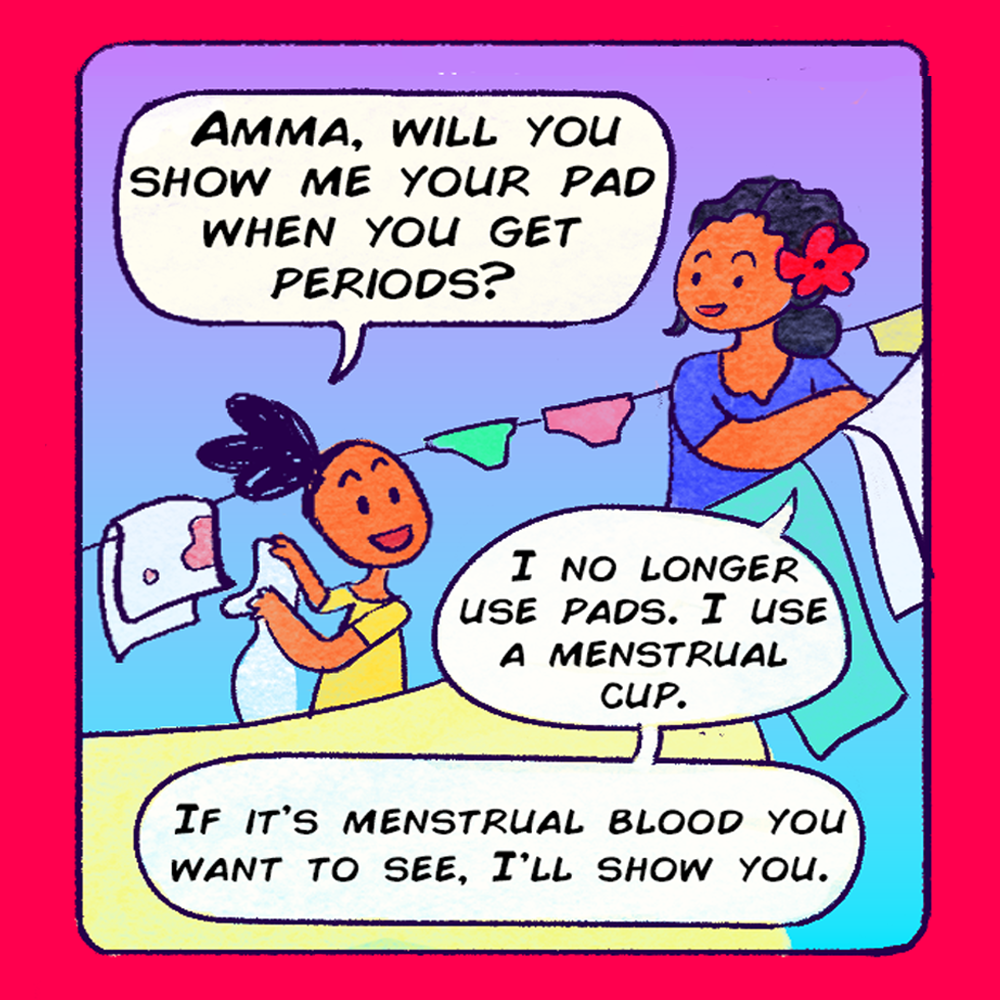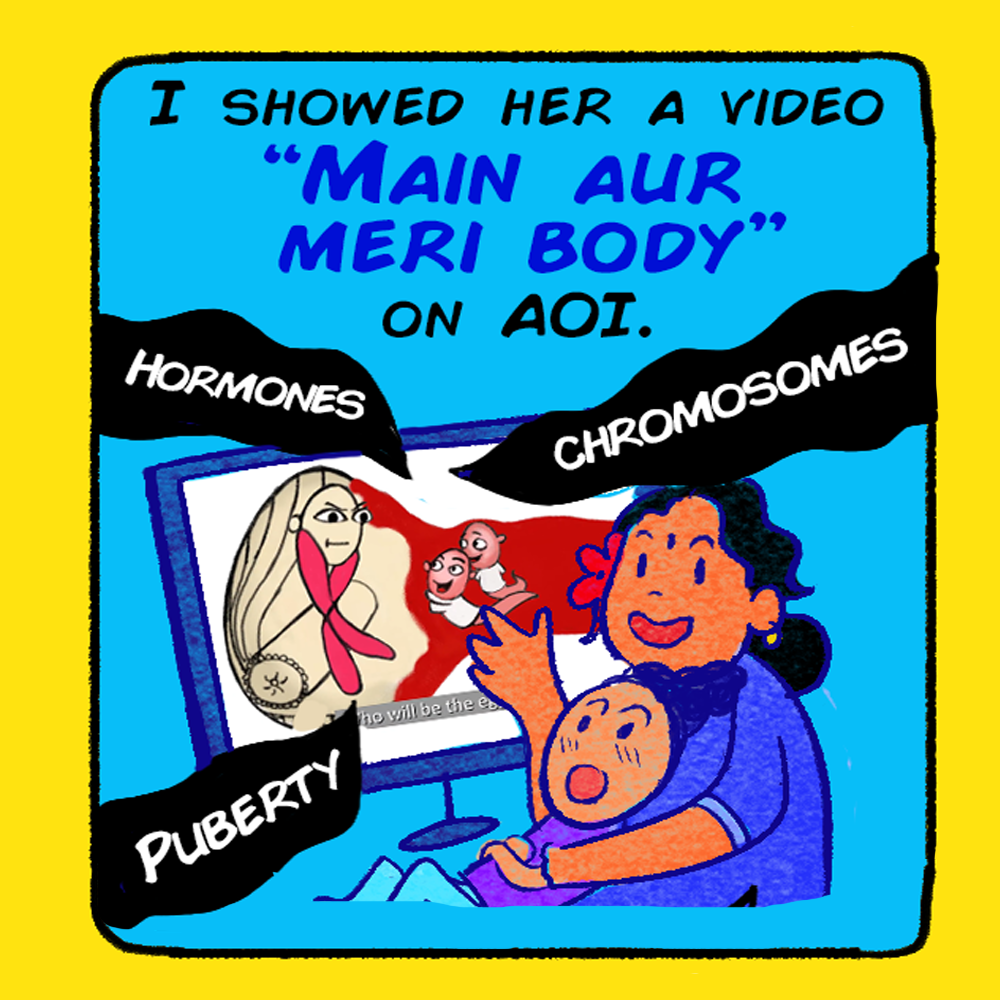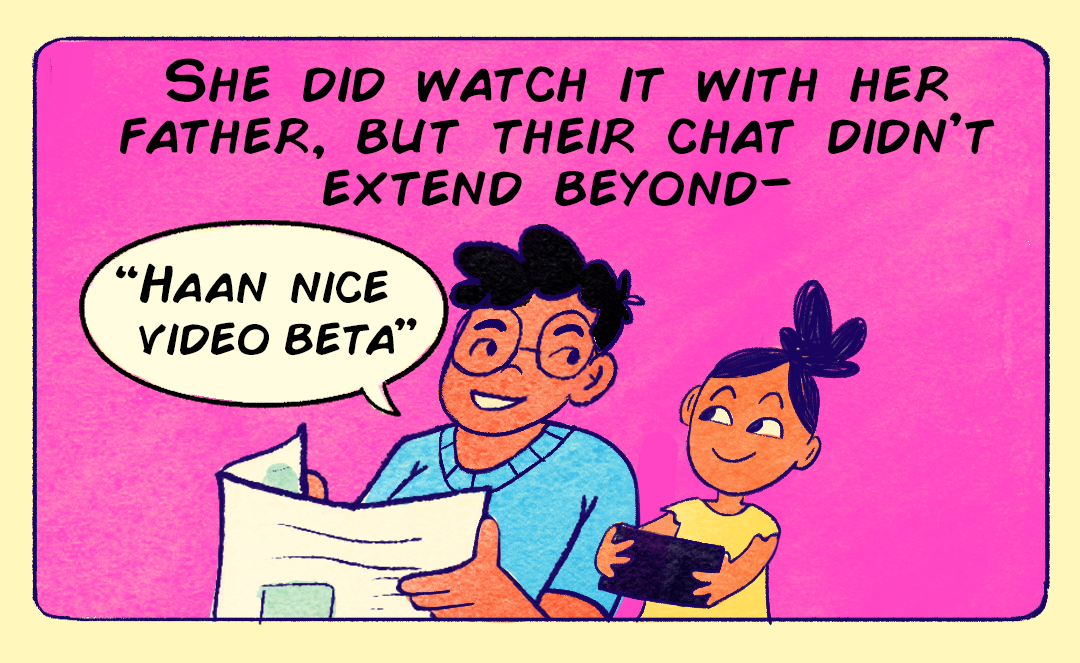“Amma, how was I born? Where did I come from?”
“We waited a long time before starting a family, and when we were finally ready, I wished for a girl child, and you were the gift God gave us.”
My daughter asked me this when she was five years old. My response was automatic - the same old platitude passed down through generations. I wasn’t satisfied with the conversation, though. I wanted more. I wanted my daughter to learn more and ask more questions, and I wanted to be the kind of parent who could listen, and respond warmly and honestly.
I sought guidance. I read anything I could lay my hands on. I attended sessions, where I developed an openness to discuss puberty, sex, and bodies with my daughter in their true form, without hiding the details partially or entirely.
I was with a group of parents and a facilitator during one such session. Everyone had a story to share about their hesitations and openness.
One mom said her teen son loves animals and has seen them mate several times. He also refers to books and websites to learn more about breeding seasons and other things. “I feel there is a certain suspense and innocence to the whole act of intimacy and I do not want to take away the thrill out of him by talking about it,” she lamented.
A dad spoke about always being shamed for looking at his naked body as a child.
Another mom said that her family of five all slept naked sometimes, just to get comfortable with each other and their bodies. (I admit, I was a little flustered by this one; I didn’t think my household was ready to sleep naked together.)
The facilitator then shared her own story about how and when she talked about sex with her four and half year old child.
She said, “Talking openly with children about their bodies, the changes that occur, and the various hormones that play with their emotions will help them become more confident and less confused.
By communicating freely with our children, a parent gives up the single narrative they believe in and begins to look at the subject from other angles. In reality, it is the parents that benefit more from this than the child.”
She was also clear that every parent has to work around their specific reservations and find ways of discussing sex with their children and that there was no fixed recipe to follow.
Later, I thought about my own childhood and adolescence. The many bodily and emotional transformations I went through, the crushes, infatuations, and so-called first love I experienced. I hadn’t had a lot of information about these changes at the time, and I conformed to the many stigmas and taboos attached with them. But, this ignorance wasn’t something I wanted to pass on to my daughter.
Thankfully, I now have access to resources and people I can reach out for guidance. The networks I am a part of already have families who have crossed the threshold of secrecy around sexuality and sensuality. And, I know I can always knock at their doors for advice.
I count Agents of Ishq (AOI) as one such map of sex and sensuality. I like to call it a both dictionary and textbook, giving sensitive subjects a fun and warm space to flourish. Most importantly, AOI doesn’t shy away from feelings and their complexity - it brings everything from discomfort to straightforwardness, from incompleteness to fulfillment - to the fore.
And so, as I learn how to talk to my daughter more freely about sex and the body, I’d like to think I’m learning how to shed my own deeply-buried shame and prejudice as well.
There’s no perfect way to have these talks - but here’s how I went about them, topic by topic.
Childbirth and Breastfeeding
(Age: 6)
I figured out the conversation's starting point, which was to talk about childbirth. I’d already told my daughter several stories about her time in my womb.
I told her how glad I was to become pregnant and how thrilled I was to learn that I was carrying a baby girl.
I described how she remained confident and at ease during all of the travels on trains and buses while the world outside feared for her safety inside my womb.
What I did not tell her, though, was the story of how she entered and exited my womb. I wanted to tell her how we prepared for the final lovely journey of a normal birth.
As an introduction, I went online and showed her many videos of animals giving birth. We spoke briefly about the intelligence that all life forms are born with and how the universe/nature facilitates this intelligence's emergence into the world.
"Amma, did I come out on my own as well?"
"Yes and no, not every woman knows how to assist her own childbirth, but we are blessed with doctors and midwives that support us in this process. And, of course, I was quite lucky to have found an obstetrician who was extremely supportive of my decision to have a normal delivery."
Following this conversation, I played a video that showed a natural human childbirth in a hospital setting. This was the first time my daughter heard the terms vaginal delivery and C-section.
With her mouth wide open in amusement , "Tell me what the pain was like for ten hours?"
"Sweet pain :) During parturition, the doctor helped ease me through the contractions and it wasn’t very painful as I know you were also working on it. My next wish was to nurse you for at least a year. That was another experience that was both difficult and joyful."
Breastfeeding continued for a year-and-a half after she was born, another topic we discussed over time. I told her about the benefits of breast milk, immunity, breast enlargement during pregnancy, and their sagging after months of frequent feeding.
One time, we had a new mom (a dear friend) visit us for a few days. My daughter was captivated by the beauty of the child clinging to his mother, suckling her breasts and eventually falling asleep.
She also saw the toll it took on the mother who fed her child at regular intervals, the strain it put on her back, and the pain she frequently felt around her breasts.
I recalled those tough times I experienced myself and suggested using hot packs to release the soreness and pain around her breasts. Hearing this, my daughter was quick in acting and made several rounds of hot packs with cabbage leaves to help my friend. .
I marvelled at this love being shown to a tired new mother and her baby. At how an upfront, thoughtful conversation had brought out the best in my daughter. Any discomfort I’d had about discussing childbirth and breastfeeding was laid to rest.
Bodies and Private Parts
(Age: Between 3 -7)
Like many of us here, I grew up associating a "chhee factor" with private parts and nudity. It took great deal of time to unlearn before I could stop feeling ashamed about bodily parts.
A friend first introduced the term "private parts" to me roughly a decade ago, explaining how she taught her son about private parts.
So, while talking to her about the body we spoke about how important it is to cover her private parts and not expose them to everyone. This went perfectly smooth with her practicing to dress her dolls well after she finished playing and not leave them around with no clothes.
Now, I raised my daughter in much the same way that I was raised, except that I never used the word "shame."
"Remember the bedridden grandpa we met in that city?"
"Yes"
"Do you remember her daughter and the female assistant who helped him on a daily basis?"
"Yes"
"Apart from feeding him food and juice, they also empty his catheter bag, which contains his urine, and wipe him after potty. Every day, they give him a sponge bath and change his clothes. If the person assisting develops aversion and disgust, he or she will never be able to do full justice to their service."
"Oh, amma, will you be able to do such work?"
"I am not sure, it's difficult to say, but I hope I attain that level of free will if I ever need to be of such help to someone."
Such conversations about nudity and private parts helped me recognise my own lack of acceptance for my body. I've always had a protruding belly no matter how much I exercised or how many sports I played.
According to what I've read online, there are numerous reasons for this, including posture issues, digestion disorders, fat accumulation, postpartum belly, and many others. When people question or see my belly, I tell them that it loves me so much that it doesn't want to leave me! :-)
My daughter observes that I take the steps necessary to feel good about my physical appearance. And there have even been moments when she would make things easier for me when I felt self-conscious about my appearance. I remember times when I looked in the mirror and didn't like how I looked, but she would come in, be herself, and give me tips about certain outfits, put on some light makeup, or do my hair in a way that made a difference. Moments like these let me recognize how judgmental I can be and how difficult it is for me to make little changes to my dressing sense. It's incredible to be around children who are so pure, non-judgemental and haven't been messed up by the media's fixed ideas of beauty.
Menstruation
(Age: 5-6 years)
"Amma, will you show me your pad when you get periods?"
"I no longer use pads. I use a menstrual cup. If menstrual blood is what you want to see, I can show you."
"Yes, please show me."
I thought it was necessary to discuss menstruation with my daughter before we discussed sex. I had ordered the Menstrupedia Comic before I even mentioned childbirth to her.
The book is divided into four chapters: puberty's physical and emotional changes, as well as the biology of menstruation.
I was 8 or 9 years old and I remember the "carefree" sanitary pad that was introduced in India. We had guests come over one time, and the ad appeared on TV. I asked my mother about the blue liquid they were showing. She felt so embarrassed that she changed the subject right away.
I grew up in a conservative, orthodox family, and there were so many taboos attached to menstruation. For a long time, I also conformed to the notions of impure, not to be touched, and to be locked up in a separate room during the periods, among other things.
I was glad that my daughter saw this as something that happens naturally and found beauty in it. I was also glad that she saw the blood on the napkin drawn in red and not blue.
Clothing
(Age: 7 years)
At age 7, my daughter was quite traditional; she preferred traditionally feminine clothing, such as lehengas and kurtis, and disliked shorts/pants and T-shirts.
Coming from a conservative background, I was at ease with her choices, but also concerned lest she should build her identity only around this one kind of clothing and become trapped in the ideology she creates for herself.
I wanted her to see that different people expressed themselves through different kinds of clothing. We sat and looked at pictures of my friends on Facebook who were comfortable wearing all kinds of clothes.
"So, what do you think?"
"I like them all, but I didn't like it when they put pictures of themselves that showed too much skin."
"Hmm, I don't always feel at ease, but I'm learning to be more accepting of other people's choices. Their clothes don't really matter to me; what matters is why they're wearing them. Is it to make an impression or a statement? Are they comfortable with their body and positive about themselves? I just want you to know that if you want to try on different clothing, go ahead, but keep your motivations under check.”
"Have you ever worn shorts and tank tops, Amma?"
"Yes I did, a few years ago, when appa and I were in California and Toronto. I sometimes wore them for myself and sometimes for appa. It felt nice to be in frocks and skirts, I felt so much younger and free."
"Why don’t you wear them now?"
"I like the simplicity and the elegance I find in kurtis, salwars and long skirts. Moreover, my choices are also influenced by my surroundings. Having said that, I allow myself the freedom to experiment with western clothing again if I so desire."
"I don't like it when people stare at my arms or legs, therefore I wear full clothing."
"Yes, it is necessary to assess your surroundings. Whether you feel safe or not around certain people, I believe that is the best approach to take."
For many years, I believed that my long hair and conservative clothing defined my character, but with time, I realized that the length of hair and clothing said nothing about me. In fact, my hair and clothing choices helped with deconditioning my beliefs. I like to be mindful of my decisions, as well as why and for whom I make them.
Sex
(Age: 5-7 years)
For me, this was a very challenging subject. Regardless of how often I talk to her, she and by extension all children, are exposed to the incomplete idea of intimacy - love, kiss, assault - through the media.
When I was eventually ready to discuss it, I went online and found the sex education video "Main Aur Meri Body" on AOI. The video explains:
All of this and more with a lightheartedness that made my job so much easier.
"Do you want to know why people say you look like a mix of appa and me? or Why do we think your nose resembles my grandmother's?"
"No, amma"
"I would like to show you a video. If you feel awkward at any moment, please let me know so that we can discuss it later."
"Ok"
After watching the video (she loved it btw).
"Listen, I know you are excited learning all this but remember some people feel uncomfortable discussing these."
"Ok. But why is that?"
"This is a private affair, and not everyone is at ease discussing it. And not all children your age are aware of this unless their parents or teachers at school inform them."
"Can I watch this with appa?"
"Sure, if he feels comfortable. It will be nice for him to also know that we spoke about this."
She did watch it with her father, but beyond nodding and saying the video was good, they didn’t engage in a lot of conversation about it.
She and I also briefly discussed gay, lesbian, and transgender relationships. And, to be honest, I know very little about their lives and world. I am learning alongside her.
It is true that discussing difficult topics with our children elevates our relationship to a new level. There is more openness and less secrecy, more bonding and less disconnection.
We also had lengthy conversations about abuse (molestation/rape), human trafficking, and prostitution.
I hope to write about them separately in the near future.
In the meantime, I’m enjoying being a mom-in-progress!
Sripriya Ravi Kumar (known to most as Priya Ravi) is a homeschooling parent based in Hyderabad. Together with her daughter Deeksha, now 10, she explores natural learning. She also holds the position of Marketing Executive at an Ed-Tech company, where she shares her expertise and continually learns about the latest trends and developments in the educational sector.


